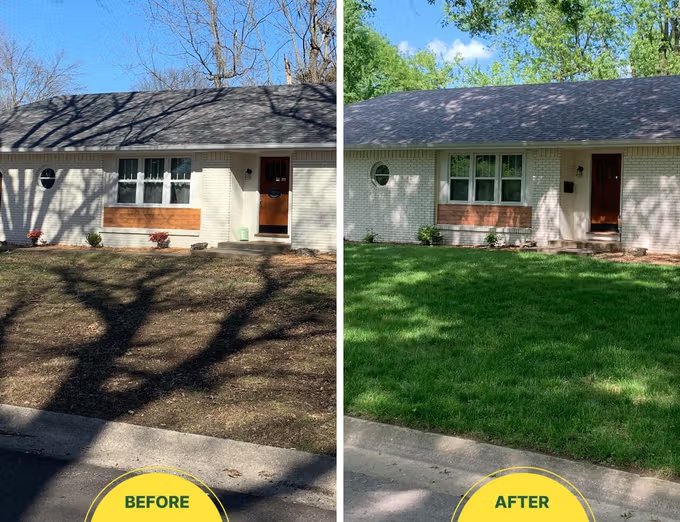Does Mulch Attract Ants?
Last Updated on May 14, 2020 by Duncan
If you live in an area with plenty of ants and looking to add mulch in your plants, you must be wondering, does mulch attract ants?
Placing mulch around your plants has plenty of benefits. During winter, it serves as a blanket and protects the roots of the plants from the tough cold.
In summer, it deflects sunlight and keeps the moisture in the ground, which keeps the soil cooler. Mulching also controls the weed population.
Does mulch attract ants?
Unfortunately, mulch does attract ants. Like other creatures, ants are driven by their need to eat, so they will visit the mulched areas to find something to eat.
When you use wood mulch, carpenter ants will be attracted by the wood smell and come to your yard to find something to eat.
If you are using organic mulches, the mulch will decompose hence attract aphids and scales. These insects secrete honeydew, a sugary liquid that attracts ants.
So when you have aphids and scales in your yard, you have high chances of having an ant problem.
Forms of mulch
Mulch comes in two broad categories: organic and inorganic. Organic mulches are byproducts of natural sources such as bark, grass, leaves, straw, nutshells, and other materials derived from plants.
Inorganic mulch, on the other hand, is one made from man-made products such as rubber, plastic, or inert materials such as volcanic rocks.
While organic mulches are more beneficial than inorganic mulches, they tend to attract ants and other insects such as pillbugs, sowbugs, earwigs, millipedes, and centipedes.
Due to this, when you are laying the mulch, don’t place it too close to the foundation of the house.
Instead, place it in at least six inches from the house. You can leave the area bare or lay in organic mulches for an aesthetic look.
Organic mulches don’t have a long life. In no time after laying them, they begin decomposing, and you have to replace them.
Inorganic mulches, on the other hand, don’t decompose so they don’t release important nutrients to the soil, but they last for a long time.
Since they don’t decompose, they are less likely to attract ants and above-ground pests.
Ant resistant mulch
Since mulches attract ants, the best way to keep them off is to use ant resistant mulch. For you to choose the right mulch, remember that mulch keeps the ground moist, which attracts the ants.
Ants are decomposers, so they like decaying mulch (organic mulch), you should go for nonorganic mulches such as:
Aromatic cedar mulch
This one discourages ants from nesting in the mulch.
According to a study done by the Journal of Economic Entomology, while fewer ants were found in areas surrounded by Aromatic cedar mulch, some ants would comfortably cross the red cedar to find food.
Cypress mulch
In the same study (done by Journal of Economic Entomology), cypress was found to be as effective as cedar mulch at keeping off the ants. The mulch was found to be ineffective when placed around oak trees or alongside buildings.
Cypress mulch is the only wooden mulch that is effective at repelling ants. All the others do attract them.
Rubber mulch
Rubber mulch is inorganic, and you don’t expect it to attract the ants.
Unfortunately, while it keeps off the ants, it has negative effects on the environment as it doesn’t decompose. Studies done at the Colorado State University show that rubber is highly ineffective at keeping out weeds, its highly inflammable, difficult to put out, and adds toxic chemicals to the soil.
Combining mulch and chemicals
Botanical extracts from cypress, sage, hardwood bark, mint, pine, juniper, and oak are highly effective at repelling red fire ants.
Studies are being done on terpenoids from beautyberry and cedars, and the results so far are promising.
Mulch laying tips
For you to get the most from mulch, you need to consider some tips.
Watch the mulch layer: Whether laying organic or inorganic mulch, never layer the mulch more than three inches deep.
This is because mulch that is this deep will never dry out, causing too much moisture in the soil, which is known to attract ants and other insects.
At the same time, ensure that the layer isn’t too shallow, defeating the purpose of use.
Leave a strip: Regardless of the type of mulch you are applying, leave a strip of bare dirt that is at least one foot wide between the mulch and house foundation. This will deter ants and tunneling termites.
You also should leave at least 6 inches of foundation showing between the ground and your home’s woodwork or siding to keep moisture from seeping into the wood. The practice also deters ants, rodents, and insects.
Keep the yard dry: If your yard tends to get wet, work at keeping it dry. You can do this by limiting the mulch layer to 2 inches or less. You also should periodically rake the mulch so that it dries out and aerates.
Replace mulch once a year: Mulch is an ideal hiding place for ants as its moist most times of the year and goes undisturbed for a long time. The deeper the mulch, the more likely it is to serve as an ant hotbed.
To avoid this, you should make it a habit to replace the mulch annually. This calls for you to remove the old mulch and replace it with a new one.
Don’t make the common mistake that many homeowners make of placing fresh mulch on top of the old one.
Use rocks instead of mulch: While pine straw, mulch, and natural ground provide an aesthetic appeal to the landscape, they attract ants and pests.
Be vigilant: Keep a close eye on your mulch, and if you notice any signs of ants, especially aboveground, think about turning the mulch or replacing it altogether.
What should you do if you have ants in mulch?
There are plenty of ways in which you can get rid of mulch in your garden. Some of these ways include:
Boiling water: If the mulch is too close to plants and vegetables, using boiling water to get rid of the ants is the most sensible way.
Simply locate the ant nest and pour hot water on it. You should note that you may have to pour the water repeatedly until all the ants are dead.
Dishwashing liquid: The dishwashing liquid soaks into the ant’s exoskeleton and suffocates them. To make the liquid, mix half a teaspoon of liquid dish soap with one and a half teaspoons of cooking oil with 1 quart of water.
Once the mixture is ready, pour some into a spray bottle and spray it directly onto the ant nest.
Boric acid and sugar: This is most likely the most effective method of getting rid of the ants. Mix boric acid with sugar until it turns into a paste. You should then place a small amount of the paste around the nest entrances.
Since ants love sweet things, they will be drawn to the paste, they will eat some of it and carry the rest back to the queen nest. It’s only a matter of time before the queen and the other ants begin dying as a result of eating the acid.
Ant poison: You will find ant poison in most garden centers. The poison is often in gel form, and it works in the same way as boric acid and sugar.
When you apply the gel, the ants are drawn to it, and they carry it into the nest for the queen and the other ants.
The cool thing is that despite the poison being harmful to the ants, it’s of no harm to the garden and plants.
While most of the poisons are made from a gel, there are some that are made from powder. These aren’t great for use in the garden as they affect plants and alter the soil due to their toxicity.
Hire an expert: If you have tried getting rid of the ants without much success, consider hiring a professional Ant exterminator to take care of the invasion.


